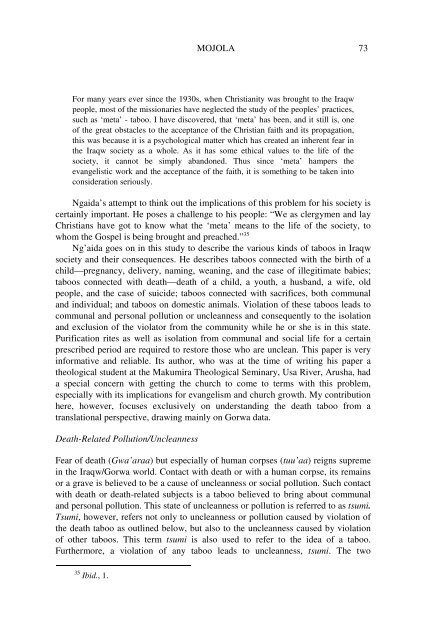Global Hermeneutics? - International Voices in Biblical Studies ...
Global Hermeneutics? - International Voices in Biblical Studies ...
Global Hermeneutics? - International Voices in Biblical Studies ...
Create successful ePaper yourself
Turn your PDF publications into a flip-book with our unique Google optimized e-Paper software.
MOJOLA 73<br />
For many years ever s<strong>in</strong>ce the 1930s, when Christianity was brought to the Iraqw<br />
people, most of the missionaries have neglected the study of the peoples’ practices,<br />
such as ‘meta’ - taboo. I have discovered, that ‘meta’ has been, and it still is, one<br />
of the great obstacles to the acceptance of the Christian faith and its propagation,<br />
this was because it is a psychological matter which has created an <strong>in</strong>herent fear <strong>in</strong><br />
the Iraqw society as a whole. As it has some ethical values to the life of the<br />
society, it cannot be simply abandoned. Thus s<strong>in</strong>ce ‘meta’ hampers the<br />
evangelistic work and the acceptance of the faith, it is someth<strong>in</strong>g to be taken <strong>in</strong>to<br />
consideration seriously.<br />
Ngaida’s attempt to th<strong>in</strong>k out the implications of this problem for his society is<br />
certa<strong>in</strong>ly important. He poses a challenge to his people: “We as clergymen and lay<br />
Christians have got to know what the ‘meta’ means to the life of the society, to<br />
whom the Gospel is be<strong>in</strong>g brought and preached.” 35<br />
Ng’aida goes on <strong>in</strong> this study to describe the various k<strong>in</strong>ds of taboos <strong>in</strong> Iraqw<br />
society and their consequences. He describes taboos connected with the birth of a<br />
child—pregnancy, delivery, nam<strong>in</strong>g, wean<strong>in</strong>g, and the case of illegitimate babies;<br />
taboos connected with death—death of a child, a youth, a husband, a wife, old<br />
people, and the case of suicide; taboos connected with sacrifices, both communal<br />
and <strong>in</strong>dividual; and taboos on domestic animals. Violation of these taboos leads to<br />
communal and personal pollution or uncleanness and consequently to the isolation<br />
and exclusion of the violator from the community while he or she is <strong>in</strong> this state.<br />
Purification rites as well as isolation from communal and social life for a certa<strong>in</strong><br />
prescribed period are required to restore those who are unclean. This paper is very<br />
<strong>in</strong>formative and reliable. Its author, who was at the time of writ<strong>in</strong>g his paper a<br />
theological student at the Makumira Theological Sem<strong>in</strong>ary, Usa River, Arusha, had<br />
a special concern with gett<strong>in</strong>g the church to come to terms with this problem,<br />
especially with its implications for evangelism and church growth. My contribution<br />
here, however, focuses exclusively on understand<strong>in</strong>g the death taboo from a<br />
translational perspective, draw<strong>in</strong>g ma<strong>in</strong>ly on Gorwa data.<br />
Death-Related Pollution/Uncleanness<br />
Fear of death (Gwa’araa) but especially of human corpses (tuu’aa) reigns supreme<br />
<strong>in</strong> the Iraqw/Gorwa world. Contact with death or with a human corpse, its rema<strong>in</strong>s<br />
or a grave is believed to be a cause of uncleanness or social pollution. Such contact<br />
with death or death-related subjects is a taboo believed to br<strong>in</strong>g about communal<br />
and personal pollution. This state of uncleanness or pollution is referred to as tsumi.<br />
Tsumi, however, refers not only to uncleanness or pollution caused by violation of<br />
the death taboo as outl<strong>in</strong>ed below, but also to the uncleanness caused by violation<br />
of other taboos. This term tsumi is also used to refer to the idea of a taboo.<br />
Furthermore, a violation of any taboo leads to uncleanness, tsumi. The two<br />
35 Ibid., 1.




